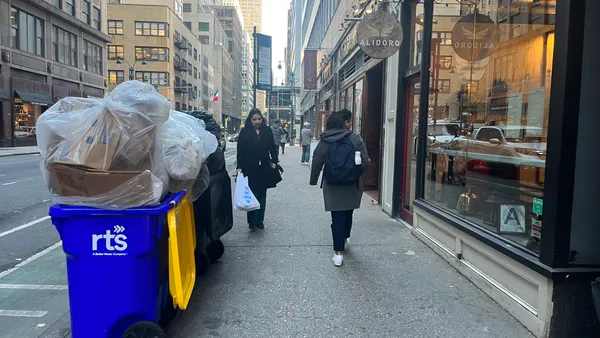Dive Brief:
- Austin, TX has put a hold on any new waste-related contracts to resolve ongoing policy disagreements between the city's Zero Waste Advisory Commission, city council and planning staff. A lobbying ban during the contract solicitation process has been temporarily lifted, a working group has been formed and all contracts up for renewal have been extended in the meantime, as reported by the Austin American-Statesman.
- The council has recently voted against two contracts related to the management of biosolids and compostable material at the city's wastewater treatment plant; one with Republic Services for collection at municipal buildings, and one for expanding a residential organics collection pilot to a citywide scale.
- The city currently contracts with Organics By Gosh to run a curbside organics collection program for 14,000 households. The pilot's expansion has now been delayed from June to September and the entire program could be canceled if a new contract isn't awarded by October.
Dive Insight:
After months of failed contract decisions, Austin's mayor has called for a resolution of these outstanding policy issues for the sake of all involved. The various stakeholders have been placing blame on each other and at least one company said it has refrained from bidding on recent contracts due to the situation. All of this comes as Austin is reassessing plans after failing to meet a 50% diversion rate benchmark in 2015.
Austin has been actively pursuing a range of options to achieve "zero waste" by 2040, though that progress could be stymied by the loss of a curbside organics collection program or biosolids composting system. Recent changes include the enactment of a commercial organics diversion requirement and a new option for curbside textile collection. The city has also solicited assistance from consultants and enlisted research fellows to learn more about residents' motivations for recycling.
As seen in multiple cities with high diversion rate goals, some level of policy debate is to be expected when complex proposals that will have long-term effects on the industry are under consideration. Because the underlying factors are often unique for each municipality, a more clear decision-making process can be beneficial.












